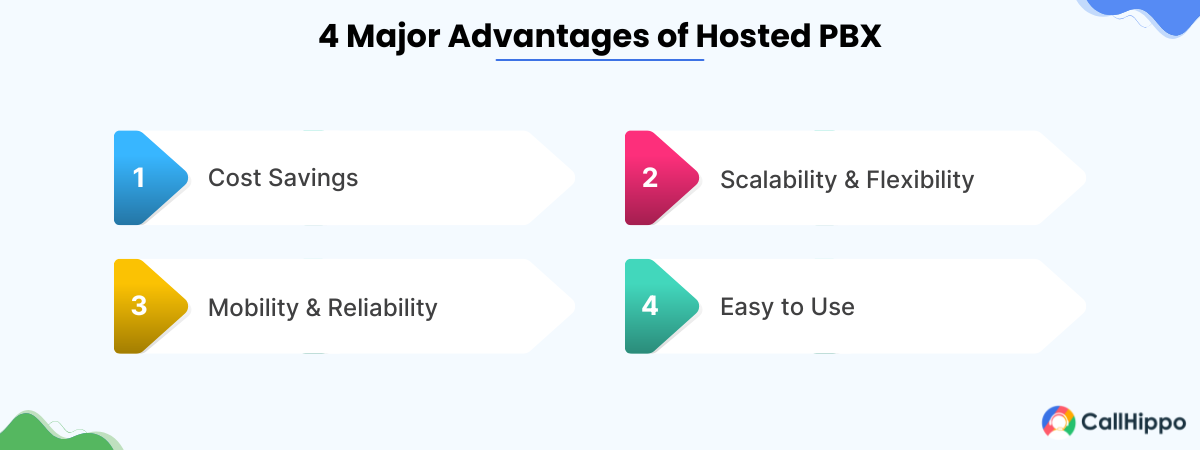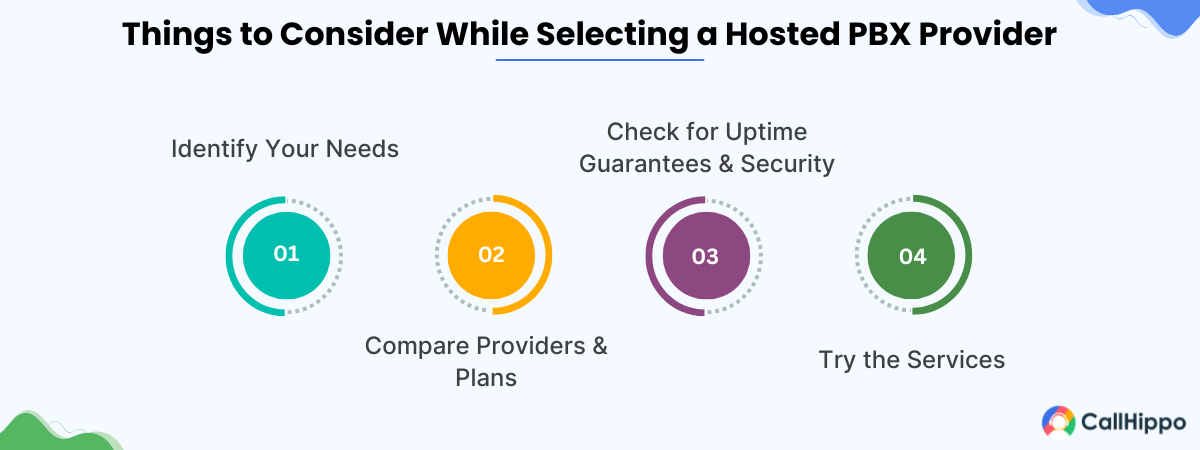

Updated : August 28, 2025
Ever heard of Hosted PBX, but don’t know what it means? A hosted PBX phone system is an easy way to handle calls without heavy hardware. It works through the internet. You get call routing, voicemail, and team tools all in one place.
Many businesses use hosted PBX solutions to provide a user-friendly experience and stay flexible, leading to significant cost savings. Works great for startups and growing companies. A hosted PBX service keeps your team and customers connected. Let’s break down how it works and why you might need it.
How Does Hosted PBX Work?
A hosted PBX system runs on the internet instead of office hardware. The Private Branch Exchange market will grow from $14.51 billion in 2025 to $31.82 billion by 2030. That’s 17.1% growth each year. Your service provider handles the servers and updates. You just need phones, laptops, or mobile apps.
When someone calls your business, the hosted PBX service routes the call through the cloud. Then it goes to the right person or team. Call forwarding, voicemail, and interactive voice response work behind the scenes.
With cloud-hosted PBX solutions, your business phone system works anywhere. No need for phone lines or heavy equipment.
Hosted PBX vs. Traditional On-Premise PBX
Should you pick a virtual PBX system or stick with traditional PBX systems? It depends on cost, flexibility, and what your business needs. Here’s how they compare.
| Feature | Hosted PBX System | Traditional On-Premise PBX |
|---|---|---|
| Setup | Uses Internet Protocol, no big hardware | Needs on-premises hardware and phone lines |
| Cost | Low start cost, pay monthly | High buying and fixing costs |
| Growth | Add users in minutes | Hard and expensive to grow |
| Upkeep | Hosted PBX provider does it | Your support team handles it |
| Mobile | Works anywhere with an internet connection | Only works in the office |
| Reliable | Cloud technology backup, 99.9% uptime | Breaks when on premises, PBX fails |
To Know More, You Can Read: Hosted PBX Vs. SIP Trunking
What Are the Common Problems With Traditional PBX?
A traditional PBX appears to be a good option, but it has its issues. These problems make many businesses switch to modern hosted phone system solutions.
- Costs too much to set up and maintain.
- Takes time and money to add more users.
- Only works in the office; remote workers can’t use it.
- When hardware breaks, you miss phone calls.
What Are the Core Functionality and Key Features of Hosted PBX System?
A virtual PBX software does more than handle calls. It combines call control, teamwork, and smart tools to make business communications easier.
1. Call Management & Routing
A hosted PBX service makes managing incoming calls and outgoing calls simple. You can route calls, set up auto attendant menus, or send inbound calls to the right team. This makes responses faster and customers happier.
2. Collaboration & Communication Channels
Cloud PBX providers give you more than voice calls. You get voicemail-to-email, video conferencing, instant messaging, and team chat. This helps remote employees stay connected when they work remotely.
3. Smart Features
Modern hosted PBX systems have call recording, reports, and work with other software. Many cloud PBX providers also turn voicemail into text and give real-time reports. All the features give businesses more control over their calls.
Quick Tip
- Ensure your internet connection meets the bandwidth requirements for optimal call quality.
- Regularly back up your hosted PBX system settings to prevent data loss.
What Are the Key Advantages of a Hosted PBX?
A hosted PBX system helps small businesses and big companies by being fully managed and scalable. It costs less, grows with you, and keeps teams connected anywhere.


1. Cost Savings
A hosted PBX service is budget-friendly with no expensive on-premises hardware. You pay one monthly fee. The service provider handles updates and support. This helps small and growing businesses save money from day one.
2. Scalability & Flexibility
Virtual PBX solutions adapt as your business grows. Add or remove users with a few clicks. No extra equipment or complex setup needed. Works great for start-ups and big enterprises, too.
3. Mobility & Reliability
A cloud-based PBX works wherever you have internet. Remote employees can use desk phones, cell phones, or laptops. Providers also ensure high uptime with backups to prevent service disruptions. This keeps your business phone system smooth.
4. Easy to Use
Managing a hosted PBX provider is simple. Most providers offer an easy-to-use dashboard. Even non-technical staff can handle changes without trouble. This ensures your team spends more time working, less time fixing phone problems.
What Are Some Common Use Cases for Hosted PBX?
A virtual PBX system works for all business sizes. Small teams look professional. Big companies handle lots of phone calls. Here are common ways people use it.
1. Startups & Small Businesses
A hosted PBX service helps startups reduce upfront costs. They get professional features without buying equipment. The system grows as they grow, incorporating new features to enhance their capabilities. This makes cloud-hosted PBX solutions smart for small teams.
For example, a new e-commerce startup can set up a hosted PBX system to route customer queries. Even with just three employees, they can use features like call forwarding and voicemail-to-email. It helps them appear professional and manage calls smoothly without spending much.
Did You Know?
- Hosted PBX systems can be set up in minutes, eliminating the need for complex hardware installations.
2. Remote Employees & Multiple Offices
A cloud PBX keeps remote workers connected anywhere. Teams in different offices use the same phone system. Conference calls go to cell phones, laptops, or desk phones. Customers and the team get the same experience.
A consulting company with offices in New York and London uses a hosted PBX service to stay connected. Clients call one phone number, and the system routes it to the right office automatically. Employees can work remotely without missing important calls.
3. Call Centers
Call centers use cloud PBX solutions for lots of calls. Features like call routing, monitoring calls, and reports improve work quality. Managers get clear insights into agent performance. This ensures better customer service always.
A tech support center uses a hosted PBX system. Calls go to the right agent based on what customers need. Leaders watch call quality and how well agents work in real time using technical aspects. This helps give faster, better support.
How to Choose a Hosted PBX Provider?
Picking the right hosted PBX system is important for smooth communication. This gives a better performance, saves money, and provides long-term reliability.


1. Identify Your Needs
List what you want from a hosted PBX service. Some businesses just need basic call routing. Others want to connect with other software. Think about how many users, remote access, and your budget. A clear list will help you not to pay for new features unnecessarily.
2. Compare Providers & Plans
Different cloud PBX providers offer different hosted PBX solutions. Compare prices, key features, and contracts. Check if plans can grow with your business needs. Comparing side by side makes it easier to find the best deal.
3. Check for Uptime Guarantees & Security
Any business phone system must be reliable. Look for companies that promise 99.9% uptime or better. Ask about data safety, call protection, and following rules. This keeps your business communications safe and working all the time.
4. Try the Services
Most hosted PBX providers let you try for free. Use this time to test call quality, dashboards, and support. Let your team try features that they’ll use daily. A trial helps you choose with confidence.
Ready to Upgrade Your Communication System?
Get started with CallHippo’s Hosted PBX Service today and streamline your business communication while cutting costs.
Troubleshooting Common Hosted PBX Issues
Even a good virtual PBX system can have issues, and most problems have easy fixes. Knowing the cause makes troubleshooting faster and helps you avoid downtime.
1. Call Drops and Poor Call Quality
Dropped calls usually mean an unstable internet connection. First, check if your internet speed is fast enough for calls. If Wi-Fi is weak, use a wired connection and close apps that use a lot of internet. Test your speed regularly to prevent call problems with your hosted PBX service.
2. Connectivity and Network Latency Problems
Network delays cause late responses, echoes, or robot voices. Restart your router or update its software. Turn on Quality of Service so voice calls get priority. If delays continue, ask your internet company to check for lost data, as a strong network makes a smooth virtual PBX system.
3. Issues with Call Routing or IVR
When phone calls don’t reach the right person, it usually means routing rules are outdated. Log in to your hosted PBX dashboard, check call flows, and test the auto attendant menu after changes. If problems continue, reset to default settings and set up again. Good routing makes customers happy with cloud-hosted PBX solutions.
4. Difficulty with Voicemail or Message Delivery
Missed voicemails might mean storage is full. Delete old messages and check if voicemail-to-email works. Make sure notification settings are right and restart the voicemail service to fix sync problems. Regular checks keep the voicemail working and efficient.
5. Integration Problems with CRM or Other Tools
Sometimes, virtual PBX software doesn’t work with other tools. Make sure software versions work together and update connection keys if needed. Disconnect and reconnect to reset them. If problems continue, check permission settings on both platforms and try to find quick fixes to prevent bigger work problems.
Remember To Monitor Performance
- Regularly review call analytics to identify areas for improvement.
- Set up alerts for missed calls or dropped connections to address issues promptly.
6. User Authentication and Access Issues
Login issues usually happen from wrong passwords or expired ones. Reset the password and check user roles from the admin settings. Verify two-factor login isn’t blocking access by mistake. Check permissions regularly to reduce login problems in cloud-based systems.
7. Troubleshooting Hardware or SIP Phone Failures
If a SIP phone stops working, restart it first. Check physical connections like cables and power. Update device software and make sure it connects to the hosted PBX service. If problems continue, try a different device to see if the hardware is broken. Most cloud PBX providers help you function properly.
8. Monitoring and Reporting Errors
Reports might sometimes show wrong or missing data. Refresh your dashboard to see if the error goes away. Make sure call recording and reports are turned on. If numbers still look wrong, export data to check. Good hosted PBX providers give you tools for deeper checks.
9. When to Contact Provider Support
Some problems need direct help from your service provider. If you tried basic fixes and problems continue, call your cloud PBX provider. Have call logs, error codes, and screenshots ready to speed up fixing. Good companies offer 24/7 help and quick escalation. Know when to call for help to save time during outages.
The Future of the PBX Systems
The switch from old phone systems to cloud-based hosted PBX is growing fast. Asia Pacific is anticipated to be the fastest-growing region, with a projected market size of USD 8,234.0 million by 2030. Here’s what to expect:
- More businesses will use virtual PBX systems to save money and stay flexible.
- Better connections with business tools like CRM, help desk, and team apps.
- Smarter call routing and reports to improve customer service.
- Better portability support so teams can work anywhere.
- Stronger safety and reliability as hosted PBX providers focus on uptime and data protection.
Cloud-hosted PBX solutions will keep getting better. They’ll become the top choice for modern business communications.
Editor’s Pick
- CallHippo stands out as a top choice for businesses seeking a reliable and feature-rich hosted PBX system. With its user-friendly interface, global reach, and robust features, CallHippo is designed to meet the communication needs of modern businesses.
Final Thoughts
A hosted PBX system is more than just a modern phone setup. It gives businesses a simple, affordable way to handle phone calls, connect teams, and serve customers better. From startups to big call centers, virtual PBX solutions offer flexibility, mobility, and reliability that traditional PBX systems can’t match.
As cloud technology gets better, hosted PBX services will become smarter and more connected. For businesses wanting to upgrade communication without big costs, CallHippo’s hosted PBX system is a good choice. It has all the features you need to grow while keeping your business communications smooth and efficient.
FAQs
1. Is PBX the same as VoIP?
No, they’re different. PBX is a phone system that manages calls for businesses. VoIP is the technology that sends calls over the internet. A hosted PBX system uses VoIP technology. CallHippo’s hosted PBX uses advanced VoIP for crystal clear calls.
2. What is virtual PBX?
Virtual PBX is the same as hosted PBX. It’s a cloud-based phone system that works over the internet. No hardware needed in your office. CallHippo offers the easiest virtual PBX system that sets up in minutes.
3. What are some of the best hosted PBX providers?
Some top cloud PBX providers include:
- CallHippo – Great for small businesses and growing companies
- RingCentral – Good for bigger businesses with lots of features
- 8×8 – Works well for call centers and remote teams
- Vonage – Solid choice for basic business phone system needs
- Nextiva – Known for good customer support
Pick a hosted PBX provider based on your business needs, budget, and how many people will use it.
4. What is the difference between SIP trunking and PBX hosting?
SIP trunking connects your existing on-premises PBX to the internet. You keep your old phone system hardware and just replace traditional phone lines with internet connections. You still manage and maintain your PBX system yourself.
PBX hosting runs your whole phone system in the cloud. No hardware needed in your office. The hosted PBX service provider manages everything, and you just use phones or apps to connect. CallHippo’s hosted PBX service takes care of everything, like updates, maintenance, and support. So you can focus on your business.
5. How do I get a hosted PBX system?
Getting a virtual PBX system is simple, especially with CallHippo:
- Choose CallHippo – Sign up for a free trial to test all features
- Pick a plan – Select the right plan for your business phone system needs
- Get your numbers – Choose local or toll-free phone numbers instantly
- Add your team – Set up users and assign roles in minutes
- Connect devices – Use desk phones, mobile apps, or computer softphones
- Set up features – Configure call forwarding, voicemail, and auto attendant easily
With CallHippo, you can get started in under 15 minutes. No technical knowledge needed. Their setup wizard guides you through everything step by step.
6. What does PBX stand for?
PBX stands for Private Branch Exchange. It’s a phone system that handles calls for a business or organization. The “Private” part means it’s just for your company. “Branch” refers to the different extensions or phone numbers. “Exchange” means it connects and routes calls.
Published : August 28, 2025

Shaily Aditya, AVP of Sales, has extensive experience leading sales teams and driving revenue in the VoIP and SaaS sectors. He leads revenue growth initiatives by developing scalable playbooks, managing high-impact teams, optimizing pricing strategies, and using AI tools to enhance team productivity and consistently exceed revenue targets.


Let’s Stay in Touch
Subscribe to our newsletter & never miss our latest news and promotions.
![]()
![]() +24K people have already subscribed
+24K people have already subscribed
Source



